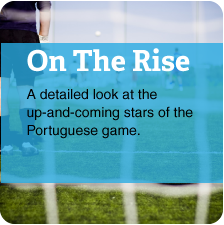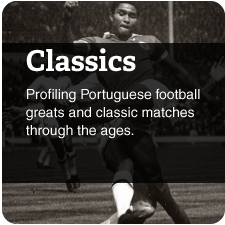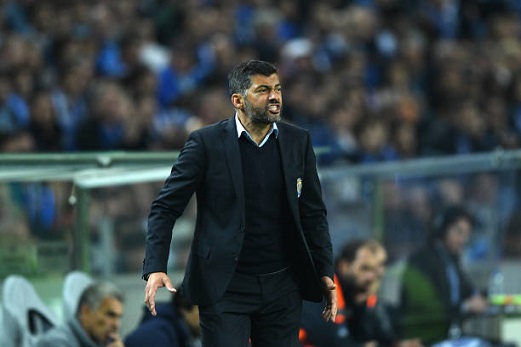 After achieving hegemony in Portuguese football (16 championship titles in 22 seasons) and prospering in Europe, FC Porto’s domestic domination and international successes abruptly ended in 2013-14. Four long seasons without a trophy, financial meltdown and a series of failed managerial appointments seemed to have marked a definitive shift in the Portuguese football landscape.
After achieving hegemony in Portuguese football (16 championship titles in 22 seasons) and prospering in Europe, FC Porto’s domestic domination and international successes abruptly ended in 2013-14. Four long seasons without a trophy, financial meltdown and a series of failed managerial appointments seemed to have marked a definitive shift in the Portuguese football landscape.
Curiously, all the coaches who occupied the hot seat at the Estádio do Dragão during the barren spell went on to achieve considerable success elsewhere after being “let go” by club supremo Pinto da Costa: Paulo Fonseca at Shakhtar Donetsk, Luís Castro at Rio Ave and Chaves, Julen Lopetegui as Spain coach, Nuno Espírito Santo at Wolves. The clear suggestion was that the problems at the club ran much deeper than the occupant of the dugout.
Then Sérgio Conceição was appointed. The fiery former Porto favourite had enjoyed a successful managerial career, but nobody quite expected the phenomenal impact he has had on the northern outfit. Porto are unbeaten and top of the league, into the semi-finals of both domestic cups, into the last 16 of the Champions League, all the while playing high-intensity non-stop attacking football. Simon Curtis looks at the rise of Sérgio Conceição.
The theatrical finale to the 2012-13 league programme that saw Benfica boss Jorge Jesus on his knees on the touchline at the Estádio do Dragão, as FC Porto managed to overhaul his unbeaten Benfica side in the final minutes of the final game of the season, provided Portuguese football watchers with another piece of Pinto da Costa comedy brilliance.
As coach Vítor Pereira wheeled away, eyes closed, fists pumping and his puffer-jacketed counterpart Jesus slumped to the ground in front of him as if in supplication to a new designer-suited God, nobody amongst the cavorting Porto faithful could have thought that this would be the last trophy won by Pereira – soon to be moved on, despite his success – or any other Porto manager up to the present day.
A club, whose coaching dynasty had been built up via the legendary partnership of the business-savvy and ambitious Jorge Nuno Pinto da Costa and the tactical mastermind José Maria Pedroto, suddenly became a metaphor for impatient managerial changes. Pereira himself was shifted out that summer, replaced by Paços de Ferreira’s blossoming new talent Paulo Fonseca in June 2013. Fonseca, since such a shining success at Shakhtar Donetsk, lasted less than a season before Pinto da Costa’s itchy trigger finger got the better of him again.
In came interim coach Luís Castro to steer the ship through to the end of a barren season, where new boss Julen Lopetegui was due to take over after being persuaded to leave his post in charge of the Spanish Under 21 squad. Lopetegui, a gruff monosyllabic communicator, enjoyed the customary patience afforded Spaniards working in Portugal, as his methods came under an early hail of criticism, which never really subsided during an uncomfortable year and a half trying to haul the club back to the top of the pile.
During these days of change in the north, rivals Benfica were emerging from their own slumber to claim the first of four consecutive league titles, a record for Os Encarnados. Under Jorge Jesus the Lisbon giants were taking back precious ground lost to Porto over the decades of dominance under the likes of a young fiery José Mourinho, the wise old head of Jesualdo Ferreira and future national coach and European Championship winner Fernando Santos.
With Lopetegui dismissed in January 2016 with what was in hindsight a reasonably sound 68% win rate (certainly unmatched by those that preceded and succeeded him), another interim coach in the trusty form of Rui Barros stepped in, until the old hand of José Peseiro was secured for the second half of the 2015-16 season.
Of the smart young guns vying for Pinto da Costa’s attention in that busy summer of 2016, it was Nuno Espírito Santo who got the nod. After showing up well in successful stints at Rio Ave, where the young manager hauled the team into the Europa League for the first time in its history and got them to both the final of the Taça da Liga and the Taça de Portugal, and Valencia, where a short but eventful spell brought a 4th place finish in la Liga, it was felt Espírito Santo could be the answer to Porto’s increasingly desperate need for trophies.
A featureless 2016-17 season brought that assumption to an abrupt end, however. Nuno was left to resurface in the second tier of the English league, where he is currently revealing just what a managerial talent he is, while 80-year-old Pinto da Costa, increasingly fragile in both health and his position as kingmaker at the club, was left to stew over the necessity for yet another knee-jerk appointment.
This time the old man’s gaze fell on Nantes and their rooky coach, Sérgio Conceição.
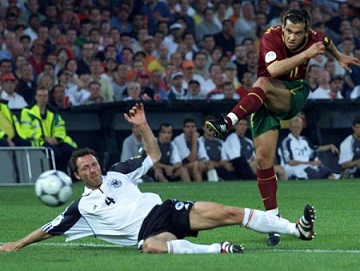 As a player Conceição had been an infamously energetic member of a Porto side gearing itself for greatness, before leaving for Italy, where spells at Lazio and Parma marked him out as an international class right sided midfielder. On entering the international arena, he had also stamped his name on things at the 2000 Euro finals with a bizarre hat trick for Portugal against a slowly collapsing Germany side. He had gathered a total of 56 caps by the time he called time on his outings for the Seleção in 2003.
As a player Conceição had been an infamously energetic member of a Porto side gearing itself for greatness, before leaving for Italy, where spells at Lazio and Parma marked him out as an international class right sided midfielder. On entering the international arena, he had also stamped his name on things at the 2000 Euro finals with a bizarre hat trick for Portugal against a slowly collapsing Germany side. He had gathered a total of 56 caps by the time he called time on his outings for the Seleção in 2003.
Like an increasing number of Portuguese players who leave their homeland, both his playing and managerial careers have fully earned the moniker “nomadic”. As a player, a journey that began at Penafiel and ended in Greece with PAOK, took in eleven staging posts in between. As a manger, he has proved equally prolific, cutting his teeth in Greece, where his playing career had petered out, and enjoying brief spells (he has managed seven clubs in seven years) in Belgium, with Standard, France, with Nantes, and in his homeland with Olhanense, Académica, Braga and Guimarães.
His arrival at Nantes had coincided with the club slumbering in the relegation zone, but his feisty brand of coaching lifted Les Canaris up into the top six in no time at all. Conceição, hailed as a master and saviour was suddenly in demand, courted by Leicester City after Premier League-winning Claudio Ranieri’s match-winning philosophies unravelled as swiftly as they had first taken shape. Conceição resisted the lure, but it was not to last.
When it came, the call from Pinto da Costa was different. Here was a club the young coach could not turn down. The president’s hope was that the firebrand coach would breathe life into an as yet still comatose FC Porto, producing a viable challenge to the all-conquering Rui Vitória regime at Benfica and an ever-stronger Sporting, by now under the guidance of the unique skill-set of Jorge Jesus. It was a big challenge, but one that Conceição professed to be intrigued and un-phased by.
And so it has proved.
The man, who as a player at Standard Liege found himself banned for spitting at an opponent and assaulting a referee, has harnessed the worst of his excesses for the good of the team. His Porto side sit pretty at the top of the Liga NOS, unbeaten this season and playing a feisty attacking game reminiscent of their coach’s finest moments in the red and green of Portugal.
With Portuguese coaches much in vogue for their scientific and flexible approach to modern football tactics, the focus is very much on Conceição’s developing grande obra in the northern Portuguese city. While Mourinho’s star may be waning slightly at Manchester United, Leonardo Jardim’s epic work last season with Monaco, Paulo Fonseca’s progressive Shakhtar team and Nuno’s barn-storming initial months at Wolverhampton Wanderers continue to push the value of this new wave of Portuguese coaching expertise to a receptive continental audience.
Conceição’s early work at Porto threatens to hoist his name into this elite group. Unafraid of tactical innovation, keen to motivate his players to achieve as highly as possible, he has not put a foot wrong so far in a season that sees his Porto side out in front in the battle for the title. And all of this has not been built solely on the ability to take advantage of an uncharacteristically floppy Benfica side and a Sporting team unused to fighting it out at the very top of the table either.
Sporting’s steady resurgence has transformed the other Lisbon giant into serious challengers and Benfica’s record, for all the brickbats flying around the smoke-filled corridors at the Luz, is not as bad as the wailing and gnashing of teeth might suggest in the Liga. All their failures have coincided with other competitions.
Through all this the wily Conceição has fired Porto to the front of the field and kept them motoring as Portugal’s sole survivor in this season’s Champions League, where they will present a more troublesome barrier to Liverpool in the Round of 16 than many on Merseyside may be expecting.
He has proved himself adaptable (only this week playing Mexican left-back Miguel Layún in a game-changing central midfield role), wise in his team selection and steadfast in the belief he shows in his ever-improving squad.
While these admirable characteristics may well be sufficient to wrest the title out of Benfica’s clammy 4-year grasp, Conceição’s presence has added another welcome element to the title race, what the Portuguese colourfully call “bate bocas”, or mouth fights. In these so-called war of words, Conceição has come to resemble a young Mourinho, infamous for taking no prisoners in his time as a chest-thumping, press-conference-devouring trainer at Porto, Chelsea, Inter and Real Madrid.
Mourinho’s bating of Arsenal’s Arsene Wenger in the good old days may have been replaced with a more snide approach to current rivals Pep Guardiola and Antonio Conte, but the younger version Mourinho made a real name for himself as The Special One in the verbal jousts he almost always initiated.
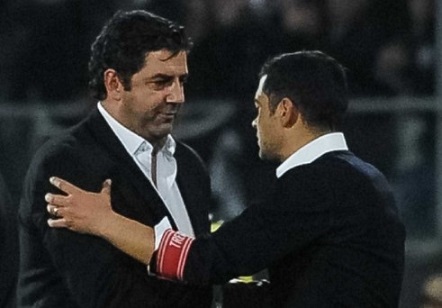 Conceição’s aim has fallen squarely on Benfica’s Vitória in recent weeks, with a comical simile making out his counterpart to resemble one of Conceição’s children’s toys that changes character when pressure is applied to a button on its head. “It has an aggressive button, which you press to make the thing aggressive,” Conceição explained to a delighted press conference at the Dragão. “It has another button which can turn you into a priest,” he continued to growing uproar among the gathered press pack.
Conceição’s aim has fallen squarely on Benfica’s Vitória in recent weeks, with a comical simile making out his counterpart to resemble one of Conceição’s children’s toys that changes character when pressure is applied to a button on its head. “It has an aggressive button, which you press to make the thing aggressive,” Conceição explained to a delighted press conference at the Dragão. “It has another button which can turn you into a priest,” he continued to growing uproar among the gathered press pack.
In activating a new war on Benfica, both on and off the pitch, Sérgio Conceição has succeeded where all recent predecessors have failed. He has ignited a fire under the northern giants which will not now be easily extinguished. The “them and us” mentality of early Mourinho is alive and kicking and keeping the focus firmly on the prizes for his Porto players.
If it transpires to be one of Pinto da Costa’s last acts in a regal half a century stewardship of the club, it will have been his final masterstroke. If it proves a stepping stone towards greater things for a coach, who can presently do no wrong, watch out for the human whirlwind that is Sérgio Conceição.
By Simon Curtis


